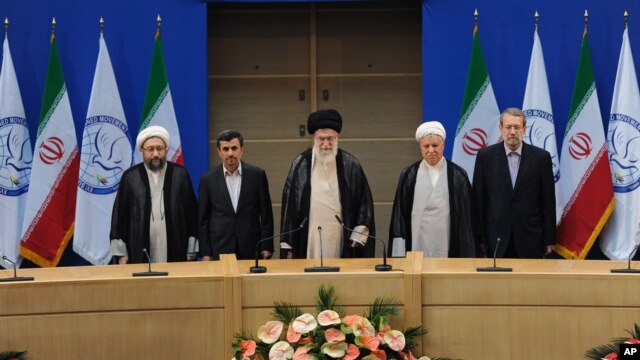
Iranian supreme leader Ayatollah Ali Khamenei, center, and other leaders, at the opening session of the Nonaligned Movement, NAM, summit, in Tehran, Iran, August 30, 2012.
Iran's Supreme Leader says his country will never develop an atomic bomb, but will not abandon its controversial nuclear program.
Ayatollah Ali Khamenei told leaders of developing nations Thursday at the Non-Aligned Movement summit in Tehran that Iran will "not give up its national right to peaceful nuclear energy."
The supreme leader's speech also took aim at the U.N. Security Council, describing it as illogical, unjust and a defunct relic of the past that the United States uses "to impose their bullying manner on the world."
Visiting United Nations Secretary General Ban Ki-moon also addressed the summit, urging Iran to comply with U.N. resolutions demanding it curb its nuclear activities. Ban warned that heightened international rhetoric over the issue risked degenerating into "war."
The U.N. chief also reprimanded Iran for "outrageous" comments denying the Holocaust and Israel's right to exist, and called on the two foes to drop threats against each other.
Egyptian President Mohamed Morsi attended the summit, making him the first Egyptian leader to visit Iran in decades. Iran cut diplomatic relations following the 1979 Islamic revolution due to Egypt's support for the overthrown Shah and its peace accord with Israel.
In comments that embarrassed Tehran, Morsi harshly criticized what he called Syria's "oppressive regime." Shi'ite Iran strongly supports the Damascus government while there is widespread sympathy in Egypt for the mostly Sunni rebels seeking to oust Syrian President Bashar al-Assad.
Egypt's Islamist leader has not addressed the issue of whether ties with Iran would be upgraded, only promising a more balanced foreign policy. Iran welcomed Egypt's 2011 revolution that brought Morsi to power.
At the summit, the Egyptian president is to transfer the rotating leadership of the Non-Aligned Movement to Iran.
The NAM is a Cold War organization that was supposed to provide a forum for countries that were allied with neither the United States nor the Soviet Union. But since the Soviet Union was dissolved in 1991 the group has struggled for both identity and clout. |
|
